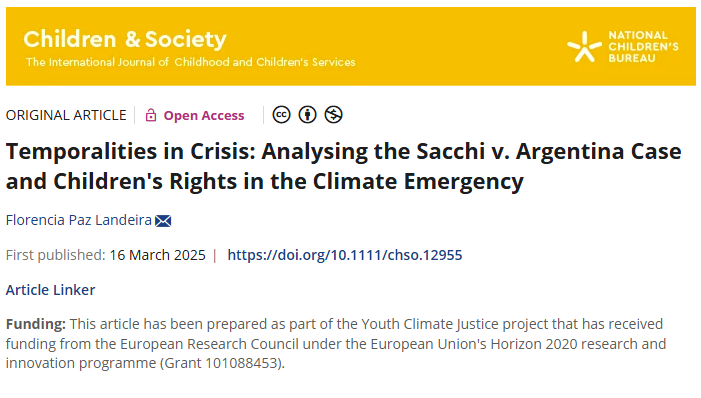Blog
New Publication Announcement: Temporalities in Crisis: Analysing the Sacchi v. Argentina Case and Children’s Rights in the Climate Emergency

A journal article entitled Temporalities in Crisis: Analysing the Sacchi vs. Argentina Case and Children’s Rights in the Climate Emergency, written by our postdoctoral researcher Dr Florencia Paz Landeira, has been published this week in the journal Children & Society. This article is open access and available to read in full on the journal’s website.
This work arises from an in-depth study of the Sacchi v. Argentina case, a groundbreaking legal action in which a group of children and youth sued five States for their contributions to climate change. Although the Committee on the Rights of the Child ultimately deemed the petition inadmissible, the case was pivotal in recognising that States can be held internationally responsible for child rights violations relating to carbon emissions.
The article presents an original approach by examining the case through the lens of temporality. Climate change, by its very nature, involves multiple overlapping timelines: rapid acceleration, gradual worsening, and profound intergenerational impacts. These time-based dynamics uniquely affect children and youth, who not only face immediate dangers but also anticipate bearing the consequences of environmental degradation throughout their lifetimes. Highlighting how these temporal aspects intersect with legal processes and human rights obligations, the article suggests that current legal frameworks often underestimate the breadth and urgency of climate impacts on younger generations.
By exploring the narratives of the young petitioners, the article underscores how children’s experiences of accelerated climate threats, uncertain futures, and emotional distress stand in contrast to adults’ perspectives and legal expectations. The child litigants express a palpable sense that “time is running out,” emphasising the immediacy of climate-related harm. Yet, they also describe slow-moving and cumulative processes -such as rising sea levels and ocean warming- that steadily undermine essential conditions for survival and cultural continuity. In doing so, the petitioners draw attention to both short-term emergencies and the long-term responsibilities of States in protecting children’s rights.
Beyond its legal analysis, the article engages with broader questions about how societies conceptualise children’s rights amid global climate crises. It highlights the importance of listening to and integrating children’s voices into environmental policy and decision-making. As the climate crisis accelerates, giving full consideration to how it intersects with childhood has never been more urgent. By weaving together legal analysis, case study insights, and socio-anthropological perspectives, the article argues for a more inclusive, intergenerational framework to address the complexities of environmental justice.
We invite you to read the complete, open-access article in Children & Society and to share it widely with colleagues and communities committed to the intersection of children’s rights and climate action.

